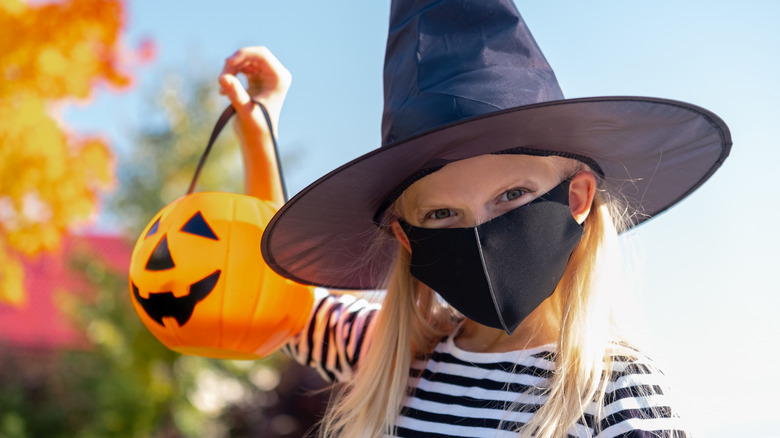What Your Halloween Mask Is Really Made Out Of
We've been wearing masks since March 2020 to survive the COVID-19 pandemic, and now it's mask season once more as Halloween quickly approaches. Whether you're looking to make your Halloween costume steamier or try a clever Halloween costume hack that won't miss the mark, a mask is a perfect addition to any costume. They can be cute or scary, bloody or enchanting. In any case, they're fun, which is what matters. Plus, depending on the mask, it could keep you and others safe from COVID-19, a definite plus.
When it comes to masks worn for coronavirus reasons, we often know what they're made of. They're typically made of fabric, though some are woven and others non-woven. According to Health Desk, blue surgical masks are non-woven, which helps filter air and the virus better, while other masks are woven and look like clothing material.
Opting to wear a Halloween mask on the big day this year, whether you're going to a party or trick-or-treating, could make a huge difference — as well as elevate your costume to a whole new level — but what are traditional Halloween masks made out of? Let's take a look.
Halloween mask material will depend on whether it's store-bought or DIY
Halloween costume masks are a creative way to round out one's costume, therefore constructing an entire persona that might be missing without it. However, we need to understand the materials we're putting on our faces. Ultimately, the material depends on what kind of mask you wear, and whether it's store-bought or homemade. DIY masks are often made from paper or felt, and they can even be made with flowers and other natural crafting supplies (via Country Living).
Store-bought masks on the other hand are trickier because they vary. According to Oriental Trading, Halloween masks are often made from plastic, though other materials used for them include latex and silicon. These are used because they're breathable and movable, allowing for a comfortable fit and flexible utility. This applies to unicorn, animal, and ghost masks, along with any other Halloween masks you see out on the street or at a party.
According to the U.S. Food & Drug Administration, latex is okay for human skin generally, but some may experience allergic reactions to it. If you experience a reaction, you should take the mask off immediately. Silicone, too, is perfectly safe for human skin (via Hero.). With that said, you can enjoy your Halloween masks in peace knowing what they're made of — and that they're safe.

